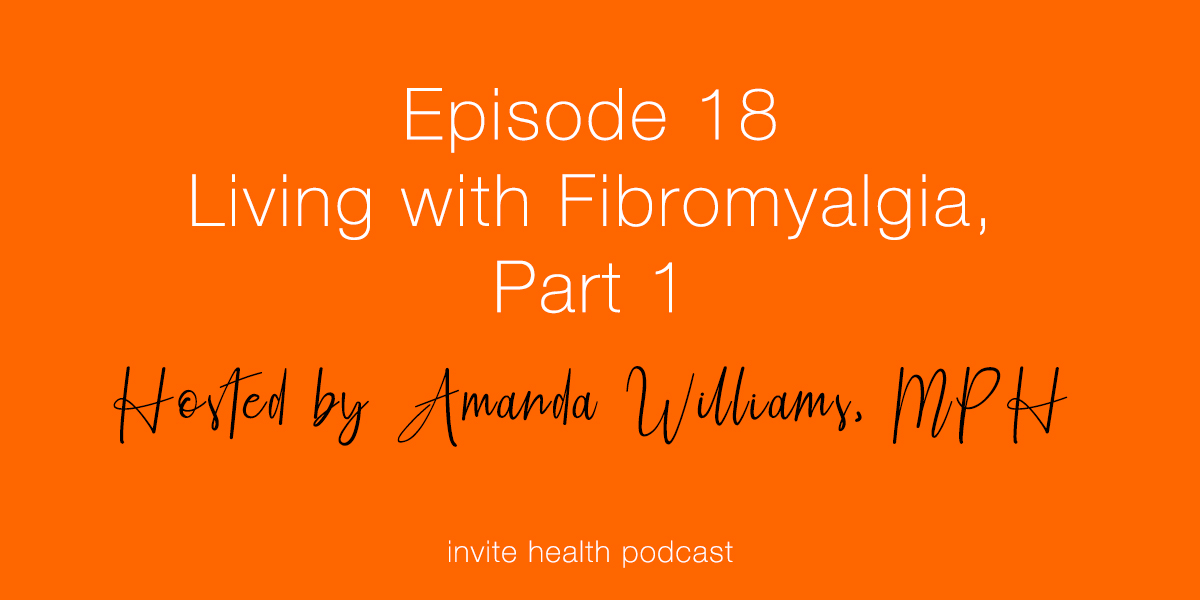Living with Fibromyalgia, Part 1 – Invite Health Podcast, Episode 18

Invite Health Podcast, Episode hosted by Amanda Williams, MPH
Subscribe Today!
The Basis
Somewhere around 5% of the US population has this condition. And you may think that 5% does not sound that high, but when we are looking at disease-states, 5% is actually a pretty solid number. This mean there are 10-15 million Americans impacted.
The problem is that so many people are often misdiagnosed or un-diagnosed, because they have a variety of symptoms, including:
- Muscle pain
- Joint pain
- Sleep disturbance
- Fatigue
- Anxiety or Depression
- GI problems
- Chronic constipation and diarrhea
- Weight fluctuation
A traditional medical approach to these symptoms is commonly to give patients an antidepressant. This does not solve the problem. You have to take a comprehensive approach to Fibromyalgia.
Fibromyalgia is a neuro-sensory disorder, which is characterized by disturbances brought on by the way an individuals central nervous system is interpreting and evaluating different stimuli – misfirings are occurring throughout your body.
Take yourself back to high school biology and try to remember a general cell structure – each component serves a different function. There is an energy source within that cell called the mitochondria. So, when mitochondrial dysfunction occurs, your cells are being starved from key energy sources that it needs. This is why, with Fibromyalgia, we have to look at what is going on at a cellular level. It is not as easy as vising your doctor and having them refer you to a physiologist. I want to be able to provide you with information so you can understand what is happening within your body.
There is a strong hormonal undertone to this condition, which is why it occurs more in women than men. Because, in this case, we have cells that are not functioning correctly and are disrupting hormone balance and enzymatic pathways, this makes sense.
Take a Look At Your Diet
If you are following a Standard American Diet (SAD), it is going to be extremely difficult for you to lead a healthy life with Fibromyalgia. The SAD is a pro-inflammatory diet that is like a slow burning forest fire in your body.
A study out of the University of North Carolina pointed out that only 12% of Americans are considered to be metabolically healthy.
So, the first step is to nourish your cells. Change up your diet and do not follow the SAD diet. I advise a Mediterranean-style diet, which published, peer-reviewed journals have proved has a direct impact on the health of your brain and cardiovascular system. There are also some basic nutrients that can help support overall wellness within the body for daily functioning.
- Magnesium Glycinate to support a healthy skeletal system†
- Coenzyme Q10 (Ubiquinol) to support cellular energy†
- Acetyl-L-Carnitine and Alpha-Lipioc Acid to support cellular energy production†
- Omega-3 Fatty Acids (found in Fish Oil, Krill oil and Flax seed) to ease inflammation in the body†
- Vitamin D to support a healthy immune system†
The second step is to do comprehensive blood testing to look at your hormone levels. This includes looking at estridial (in both men and women), free and total testosterone, DHEA sulfate and cortisol. Looking at just the Thyroid Stimulating Hormone (TSH) is not enough.
Step three is looking at the role that inflammation plays in your body. When it comes to the SAD, many Americans are walking around in a pro-inflammatory state. This needs to be addressed, as inflammation is causing damage to your cells.
Stay tuned for an episode on the Meditteranean Diet, coming soon! Thank you for tuning in to the Invite Health Podcast. You can find all of our episodes for free wherever you listen to podcasts or by visiting www.invitehealth.com/podcast. Make sure you subscribe and leave us a review! Follow us on Facebook, Twitter and Instagram at Invite Health today. We’ll see you next time on another episode of the Invite Health Podcast.
